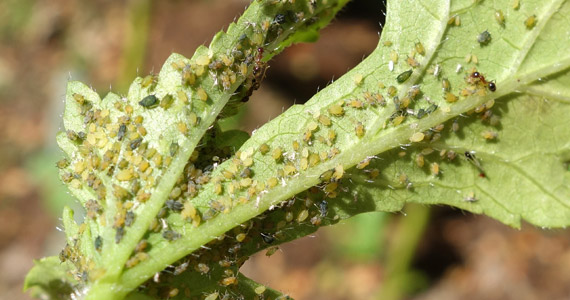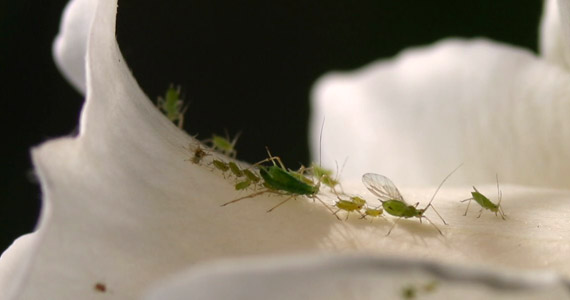About the pest in brief
- What are aphids?
- When we refer to aphids, or plant lice, we usually mean a super family of insects which includes over 4,000 species of plant-specific parasites.
- What can you see?
- Aphids can cause decreased growth rates, mottled leaves, yellowing, stunted growth, curled leaves, browning, wilting, low yields and death in plants.
- What can you do?
- There are several cultivation techniques that we can use to prevent or minimise an attack of aphids.
Biological cycle of aphids
Aphids can be winged or wingless. Usually, the first generation to hatch after the winter is wingless. However, after several generations there can be a lack of space on the host plant. This triggers the birth of a generation of winged aphids, which can migrate to other hosts. All the aphids born from the winter eggs are females. Several more generations of female aphids are born during the spring and summer. Females can live for 25 days, during which time they can each produce up to 80 new aphids. Spring and summer reproduction occurs asexually – without males.

Symptoms of the pest
The aphids feed on phloem sap, which weakens the plant and causes a metabolic imbalance, twisting of the leaves and, in extreme cases, causing leaf loss. Leaf loss affects the quantity and quality of the final harvest. Aphids also introduce toxins into the plant, systemically altering its development.
Furthermore the honeydew secreted by the aphids is an ideal culture medium for a range of various fungi, which form a barrier on the leaf, stopping it from taking in all the light that hits it.
However the most harmful effect of aphids is the transmission of viruses. Aphids can transmit dozens of viruses from a diseased plant to healthy in just a few seconds, especially the winged generations. The biggest problem with viruses is that there is no remedy for them, so the infection of a plant that is not tolerant or resistant to the virus leads inevitably to a decline in the final production.
How to prevent the pest?
There are several cultivation techniques that we can use to prevent or minimise an infestation of aphids. These include:
- Eliminating weeds that can serve as a reservoir of eggs and adults
- Using insect nets (sometimes insecticide-impregnated) to cover crops
- Avoiding the excessive use of nitrogenous fertiliser
- Removing crop residues establishing plant species that can serve as a reservoir for predators (banker plants)
- CANNACURE can be sprayed on the plant to prevent aphids

Solutions for controlling the pest
The natural enemies of aphids include ladybird beetles (or ladybugs) and lacewings. Green lacewing larvae (Chrysoperla sp.) are voracious predators of aphids. CANNACURE can be sprayed on the plant to control aphids.






